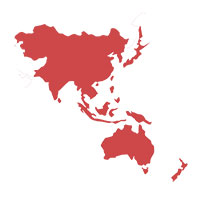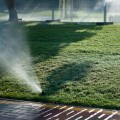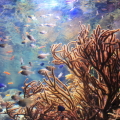PIPA: A Big Playground
Holly Dove | May 16, 2015.
Most kids are still finding their feet in the world at age nine.
Created just nine years ago at a convention on biodiversity in Brazil, the Phoenix Island Protected Area (PIPA) is facing growing pains. Instead of protecting its school lunch from bullies though, it is protecting its fish from illegal fishermen and its reefs from coral bleaching.
Anote Tong, Kiribati’s president, signed a cooperation agreement with the United States at the World Parks Congress in Sydney late last year.
Phoenix Island shares a boundary with an American marine reserve known as PRIMNM (the Pacific Remote Islands Marine National Monument). Right in the middle of the Pacific Ocean, just below Hawaii, the two protected areas are collectively known as the ‘Phoenix Ocean Arc’.
For a small island state such as Kiribati, having the US on side is key.
Secretary of the Interior Sally Jewell said that signing the agreement means important activities can now be shared, such as law enforcement, removal of shipwrecks, scientific research, conservation of sea birds, and eradication of non-native species from the remote atolls.
“Our work together will conserve sea birds, fish, and other wildlife,” says Jewell.
“We will be able to use [resources], such as the US coastguard and technologies, as well as the US military in the area [working] alongside the people of Kiribati, who know this ocean scape better than anybody.”
Partnerships with powerful states provide equipment, technology, scientific expertise, and funding. They are essential if Pacific island countries are to maintain autonomy over their resources and protect their marine reserves. Without them, they have to accept money from vested interests, such as fishing corporations.
Kiribati’s income largely comes from selling access to reef and tuna fish to nations such as Japan, South Korea, and Spain. In return for a commercial fishing license, a foreign company will often pay approximately five per cent of the wholesale value of anything they take out of Kiribati waters. Such unequal exchanges undervalue the importance of coral reef systems, marine life and ocean ecology, and undermine the locals’ sovereignty over their resources.
Until recently, such activities were taking place inside the PIPA itself. Investigative journalist Chris Pala exposed the issue early last year, claiming up to 97 per cent of what had been described as “off limits to fishing and other extractive uses” by officials was, in fact, being heavily fished.
“When PIPA was created,” Pala recounts, “only in three per cent of the reserve that’s around the islands, where virtually no fishing was going on, was it banned. In the rest of the reserve, the catch increased, reaching 50,000 tonnes in 2012 – an unheard-of amount in any protected area.”
It’s a classic case of being stuck between a reef and a hard place—without support, these small island nations are selling off their best assets for a shockingly trivial amount; and the world suffers with them as we lose our functioning ocean ecosystems. The small amount of money made goes toward local infrastructure, healthcare and other social needs. Protecting one of the world’s biggest marine reserves doesn’t often make the cut when there aren’t enough hospital beds.
Cracking under international pressure, President Tong announced in May 2014 that PIPA would be completely closed to commercial fishing. Joining forces with the US was the next step in what would be an ongoing journey to make safer marine reserves.
- So why is the extra effort towards the creation of marine reserves important?
Marine protected areas benefit anyone who depends upon the sea. That’s essentially everyone on this planet. We all breathe air that the ocean’s phytoplankton emit and eat food that depends on intricate ocean ecology.
Oceans account for one-third of the world’s emissions as a carbon sink, and help to regulate global temperatures. When over-fishing and trawling occurs, the fabric of this ecosystem is impacted, which in turn leads to drastic imbalances.
For people whose direct livelihoods depend on the sea, marine parks allow fish populations to flourish and spread outside the protected areas—boosting fish stocks, allowing reef systems to grow and providing tourism opportunities.
The Phoenix Arc has strong conservation ethos, supporting opportunities for global research. With increasing pressures on the ocean, there could not be a better time for safe havens of the sea to be prioritised and managed seriously.
Jewell summed it up nicely:
“The Pacific Ocean provides food security, global weather and climate stability, recreation and inspiration, and jobs and prosperity. Protecting the health and integrity of these vast wild areas and their marine wildlife is good national and international policy and demonstrates to the world the benefits of cross-border marine protection.”
Phoenix Island spokesperson Betarim Rimon said this remainder of this year would focus on training and sharing human resources, alongside enhancing education programmes.
“There is a saying that more candles, more light – so the benefit is in our countries’ joint force together to share…lessons and resources all aiming at enhancing the protection of MPAs.”
Rimon said he hoped the MPA would join forces with other countries, besides the US, in the future.
“Doing things alone will have minimal effects but having more countries helping each other in this cause will certainly build momentum and will make bigger results” he said.
Photo: National Geographic/Paul Nicklen













comment